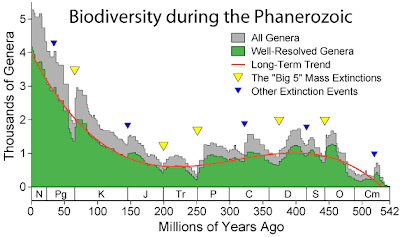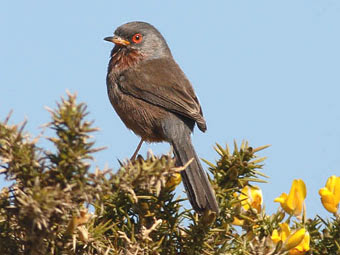The other day the excavators moved back into our local patch of Surrey woodland. Well, I say woodland, but actually these days it's more like a scene from the Battle of the Somme. Where once we had trees, we now have vast tracts of open muddy ground, fought over by squadrons of earth-movers and teams of men armed with chain saws.
When these people first appeared a couple of years back we assumed it was yet more houses, and girded up our nimby loins to protest. But it wasn't that at all.
It turned out that all across Southern England thousands of acres of woodland are being uprooted as part of a commissariat masterplan to recreate Egdon Heath. Something called Tomorrow's Heathland Heritage is costing us £25m plus, and will take at least a decade to complete. It's all in the name of biodiversity, the idea being that we need fewer trees and more Dartford Warblers (pic above), rare bees, rare heathers etc etc.
There are some familiar points to make. First, much of our heathland only disappeared originally because a previous generation of commissars planted socking great forests on it after WW1 (ie the Forestry Commission). With the benefit of hindsight it seems that was a mistake. But of course, this time round the commissars are sure to have got it right. Right?
Second, nobody asked me or other local residents what we thought. The website for our local restoration project promises more adders, spider-hunting wasps, and insectivorous sundew plants- the only thing missing is wolves. Is that what locals want? Plus, residents have had to put up with all the noise, mess and general harassment of the work, and are losing their tree privacy screens into the bargain.
Third, why should we pay taxes just so the commissars can have a go at playing God? Who says heathland is better than woodland? Our landscape has constantly changed, and as we understand it, most of Southern England was forested until the arrival of agriculture. Why should the commissars decide heathland is the landscape of choice for us?
But this is part of a much bigger picture.
Last Friday, the BBC Today programme ran yet another of its eco items. One of their scores of eco-reporters was hunkered down on the Dartford marshes with a man from Buglife. He had a four minute slot to push their campaign to save some endangered bug.
Fair play to Buglife. They are a campaigning group, and of course they'd take a free slot like that. But as always, we were left wondering about money: who are Buglife and how do they fund themselves?
Buglife is a registered charity, and their website lists an impressive array of private funders and corporate sponsors. But nestled right in among them we find the 2010 Biodiversity Action Fund, the Environment Agency, the Heritage Lottery Fund, Natural England, and the Scottish Environment Protection Agency. In other words, the taxpayer.
So how much are we taxpayers in for? As always, it's fiendishly difficult to find out. But according to Buglife's latest published accounts, in 2006 they had total funding of £284,218, of which £208,711 was "restricted"- ie "the charity successfully bid for a variety of grants". We're guessing most of that £208K was from us.
But let's not pick on Buglife: they're just one of many NGOs who are getting our money for biodiversity projects.
And the NGOs are just one part of an even bigger picture. According to Annual Biodiversity Indicators In Your Pocket 2007 (ONS), in 2005-06 the government spent no less than £360m on UK biodiversity projects, and a further £25m on global projects. That's well over twice as much as the NGOs raise for themselves.
We have no objection to Buglife. Or their campaigns. Or any of the thousands of similar campaigns that have sprung up around the place. But we do object to being taxed to pay for them.
And we do object to the massive quangocracy that has inevitably sprung up on this patch of reclaimed heathland: the new superquango Natural England spends around £250m pa, including £90m pa on staff (see their first Report and Accounts here).
We have no confidence in the commissars' ability to manage our biodiversity. None whatsoever. After all, they spend most of their time trying to stamp out diversity, and according to the following chart, biodiversity managed pretty well for hundreds of millions of years before anyone even thought of commissars:
 And while we'd have much more trust in the bottom-up enthusiasm of voluntary groups, as we've blogged many times (eg here), voluntary groups principally funded by government grant are no more than biodiversified quangos.
And while we'd have much more trust in the bottom-up enthusiasm of voluntary groups, as we've blogged many times (eg here), voluntary groups principally funded by government grant are no more than biodiversified quangos.
So stop taxing us to play God.
And while you're at it, stop bulldozing our woodland without even asking us.
